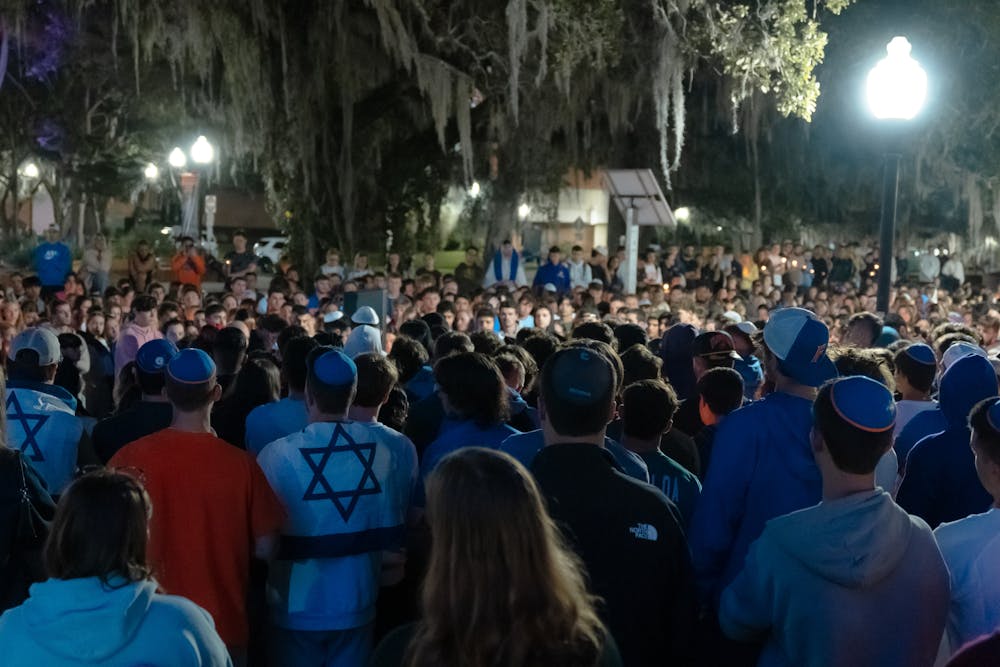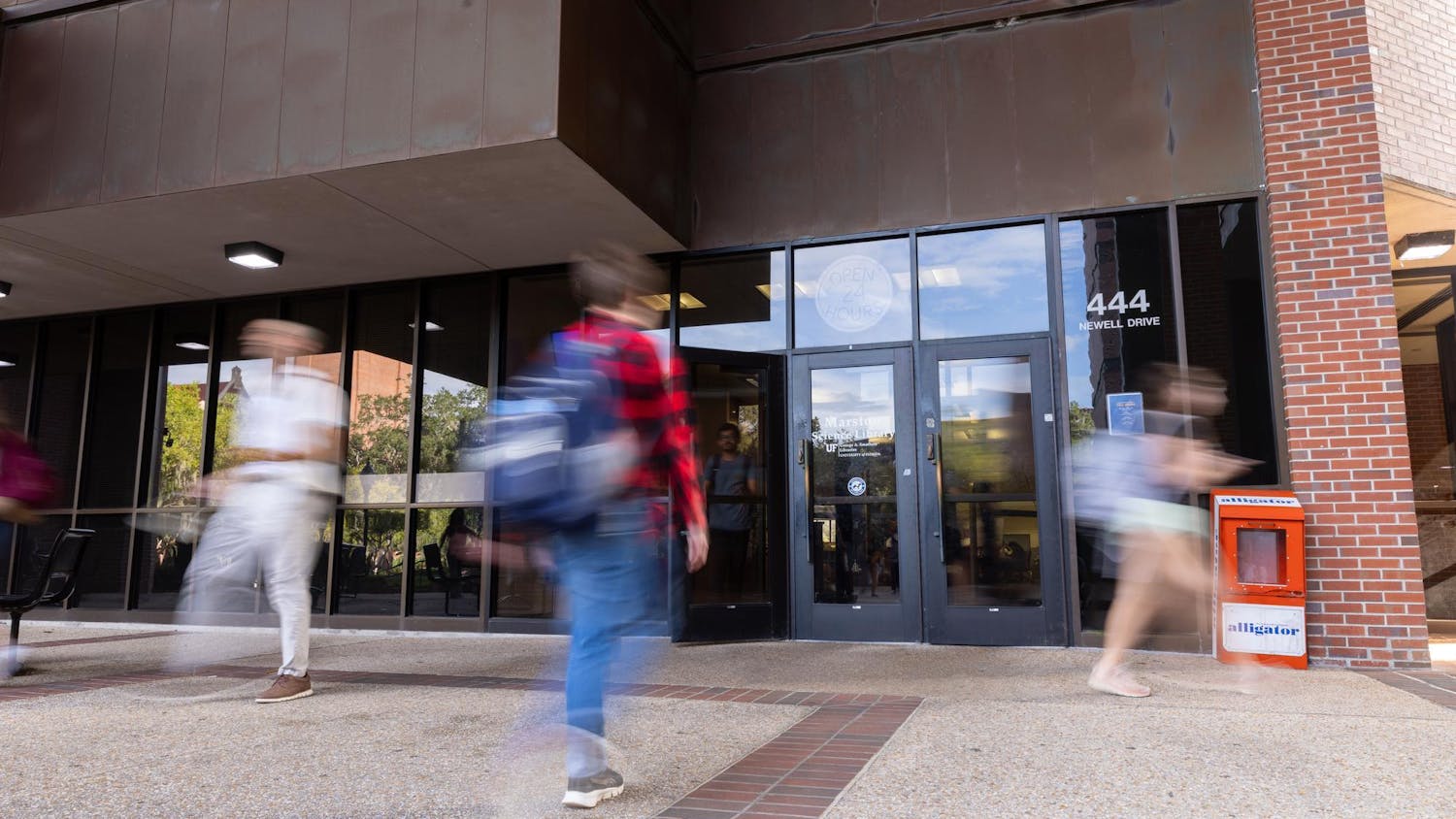When a vigil for Israel descended into chaos after students perceived a loud noise as gunshots on Oct. 10, 2023, the only thing on Mordechai Krasnjanski’s mind was to run to safety.
The 26-year-old UF Jewish law student said his experience at future events related to Israel or Jewish solidarity has changed since the vigil. He’s become more vigilant on a personal level, he said.
“It was almost like people were expecting or bracing themselves for something to happen,” Krasnjanski said. “Everyone was on edge, you know, I definitely remember that being a shared thing.”
The Israel-Gaza conflict has been a source of controversy for several decades but was most notably amplified after Oct. 7, 2023, when the militant group Hamas launched an attack on southern Israel. The attack killed 1,200, mostly civilians, with 250 taken as hostages to the Gaza strip.
Israel began a full-scale invasion in retaliation, which is still ongoing. Over 40,000 Palestinians have lost their lives in the past year due to the conflict, according to Gaza’s health ministry.
On UF’s campus, students have often found themselves divided on the issue. Protests, arrests and polarization have become the new normal for students to witness as they stroll through Plaza of the Americas or University Avenue.
Similarily, the rise of antisemitic and anti-Muslim rhetoric increased significantly in Western countries after Oct. 7, 2023, according to an article by The Hill citing the Anti-Defamation League and Tel Aviv University.
Pro-Israel sentiments
Over 1,200 were in attendance at a UF vigil for Israel held at Turlington Plaza Oct. 10, 2023, just three days after the Oct. 7 attacks. Nearly 30 minutes into the vigil, a noise had startled attendees, who then panicked and began running. About 30 students were injured in the panic.
Rabbi Berl Goldman, the director of the UF Chabad Jewish Student Center, said antisemitism and anti-Israel sentiments have been prevalent long before Oct. 7, 2023. He said many Jewish students, faculty and community members feel vulnerable when expressing their support and solidarity with Israel.
“The answer is not to cower, the answer is not to be fearful,” Goldman said. “We are here to express our Judaism and our pro-Israel alliance proudly and in the open.”
UF holds the largest number of Jewish undergraduate students in the country at around 6,500. About 19% of UF undergraduates are Jewish, according to Hillel International.
Goldman said the Oct. 7 attacks only amplified and highlighted anti-Israel rhetoric, with incidents of vandalism and threats increasing over the past year. UF Chabad was vandalized November 2023 with antisemitic graffiti, as previously reported by The Alligator.
Since Oct. 7, misinformation has spiked with the use of altered images, claims of crisis actors and false narratives, according to a report by PolitiFact. The report outlines claims circulating on social media sites, such as X, claiming violence in Israel and Gaza was “fake” or downplaying casualties of the conflict.
Goldman said misinformation on the conflict is rampant, and finding authentic and truthful sources of information is a complicated subject. False information is being used to project lies and terrorism, he said.
“No one wakes up Oct. 7 in the morning in the Holy Land of Israel or anywhere and says, ‘Oh, let's kill Jews,’” Goldman said. “No one does that. That has been nurtured and harbored since birth, that has been taught, that has been planned for, that has been trained for, that has been funded.”
Sara Beer, a 21-year-old UF public relations senior, is the president of the UF Jewish Student Union. Also present at last year's vigil, Beer said she felt happy and prideful but nervous to be there. Every noise she heard made her turn her head, she said.
When the panic unfolded, Beer was stepped on and had lit candles fall on her.
“It was just an instantaneous feeling of being so scared,” Beer said. “I’ve never come into a Jewish space before feeling that way.”
When pro-Palestinian protests began on UF campus, Beer said many Jewish students were struggling to navigate their feelings. She said she understands people wanting to defend themselves, but it was scary to read signs targeting Jewish people.
Still, Beer said she never felt endangered because of campus police and UF administration's response. She said she’s been able to attend meetings with Interim President Kent Fuchs and the Dean of Student Life where they could converse on how Jewish students were feeling.
As JSU president, Beer said she will continue to hold events and learning opportunities with her organization.
“I totally understand free speech,” Beer said. “But when you're putting another group in that position where they feel like they can't really even walk on campus, at a school that they choose to attend to, and they don't feel welcomed or supported, that's when things happen.”
Pro-Palestinian sentiments
On Oct. 10, 2023, UF’s Students for Justice in Palestine released a solidarity statement on its Instagram mourning “the loss of innocent Palestinian and Israeli civilian life,” noting that the “root of violence, apartheid and occupation under Israel’s far-right government must end for peace.”
The organization is among several, like the UF Divest Coalition, UF Jewish Voice for Peace and Faculty and Staff for Justice in Palestine, who have opposed Zionism and called for the university to protect students.
Meir Schochet, a 21-year-old UF astrophysics junior, felt terrified as a Jewish student after Oct. 7 as their brother was studying in Israel. Yet Schochet has felt stuck and often isolated in the Jewish community as they’ve expressed support for Palestinians and Gaza.
Schochet, who co-founded the anti-Zionist organization UF Jewish Voice for Peace, said UF JVP has stayed at 10 members or fewer since it began in 2022. They said the organization has low membership because organizations like UF Hillel and UF Chabad have been able to do more outreach.
“As a Jewish person, if you don't buy into the hegemony, you're just kind of stuck,” Schochet said. “Which is where I have felt I have been for a while.”
Schochet was celebrating Rosh Hashanah with family at a campus organization when a UF donor began urging Jewish students in attendance to report faculty members and professors sharing pro-Palestinian sentiments, they said.
While Schochet did not get the donor's name, they felt disheartened to hear such rhetoric in a Jewish space, they said.
Some of the biggest issues surrounding the conflict on UF’s campus are apathy and propaganda, Schochet said. American Jewish culture makes Jewish students believe they’re entitled to the land in Israel, they said, while disregarding Palestinian lives.
“If you are on social media and you don't have the dead children on your for you page, then you're just blind to suffering that's happening in the world because that’s suffering that’s been going on for decades,” Schochet said.
As the death toll has grown in Gaza, so have international calls for an end to occupation.
In September 2024, the U.N. General Assembly demanded that Israel end its occupation in one year and “that Israel must be held to account for any violations of international law in the Occupied Palestinian Territory,” according to the meeting report.
Malini Johar Schueller, a professor in UF’s English department, is the faculty adviser for UF SJP and UF Jewish Voice for Peace. She said she ensures students in these organizations have meetings and guidance but doesn’t tell them what to do.
Schueller said 2024 marks her second year serving as the UF JVP faculty adviser, and the organization has many dedicated Jewish and non-Jewish students. She said it’s heartening to see rituals the UF JVP students have associated with Judaism, which they invoke as they're talking about Palestinian rights.
While she acknowledges she is not an expert on the Middle East, Schueller said the current situation surrounding Israel and Gaza has an extensive history, and believes people should read international law and look at U.N. resolutions, specifically dating back to 1948 following the Arab-Israeli war.
“One thing that people don't know, there are major Israeli-Jewish historians who have written about the Palestinian rights,” Schueller said. “You know, people think that this is some sort of completely ethnically divided and religiously divided issue. It is not.”
Campus protests on the rise, calls for divestment
On April 23, UF Students for Justice in Palestine called for an emergency protest asking for the university to “divest from apartheid” and to show solidarity with Gaza. Ultimately, six days later, nine pro-Palestinian protesters were arrested at UF’s Plaza of the Americas.
The April arrests came after campus police distributed flyers with a list of allowable and prohibited protest activities. The three listed allowable activities were speech, expressing viewpoints and hand-held signs. Among the 13 prohibited activities were sleeping, amplified sound, unattended signs and violence, The Alligator previously reported.
The protesters have since been suspended from campus and many have accepted deferred plea agreements with the state. One student still faces a potential felony after being accused of spitting on an officer.
The arrests were among the firsts in Florida, though several universities nationwide have been the site of pro-Palestinian protests resulting in arrests.
Recently, Alachua County divested from all corporations, including those that support weapons production, from its investment portfolio, but the City of Gainesville has not, The Alligator previously reported.
When asked about divestment, Gainesville Mayor Harvey Ward said state statutes prevent the city from divesting for “non-pecuniary” reasons, meaning political and ideological.
Still, Ward said Gainesville has a long history of supporting protests and he supports everyone's ability to do so. He said there are upcoming plans for 2025 to remodel the area in front of City Hall to make it easier for large groups to gather, but those plans are not because of the pro-Palestinian protests happening.
Ward urged anyone with concerns about divestment to reach out to legislators across the state.
“We don't make those decisions locally, that is the most important thing to understand,” Ward said. “That when there is statute governing how we can make investments, that there is a way to change those statutes, but it's not at City Hall.”
Contact Vivienne Serret at vserret@alligator.org. Follow her on X @vivienneserret.
Vivienne Serret is a UF journalism and criminology senior, serving as the Fall 2024 race and equity reporter for The Alligator's Enterprise desk. She previously worked as a columnist and previously reported for The Alligator's university desk as the student government reporter. She loves karaoke and lifting at the gym.






